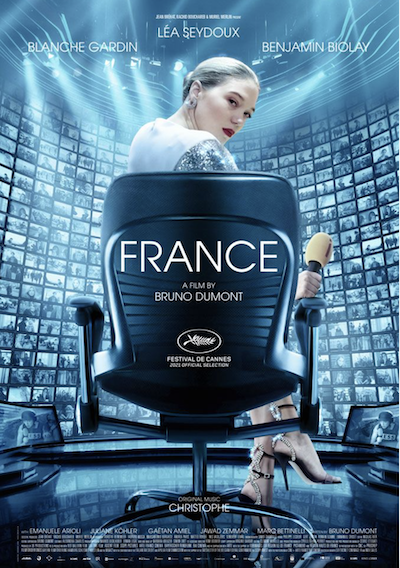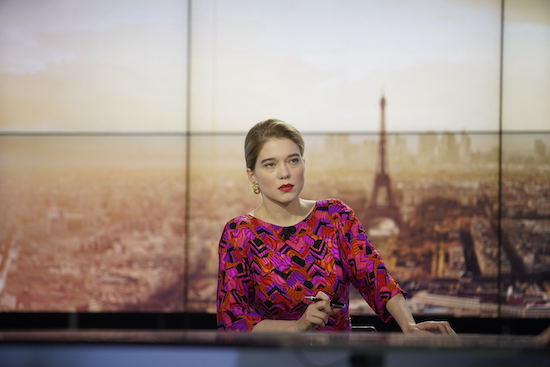France: Celebrity and the Need for It

French filmmaker Bruno Dumont has never played by any movie-making rules, which has resulted in a fascinating career of provocative and unsettling work, most of which can be classed as art films. A former philosophy professor, Dumont has clearly relished exploring themes of good and evil, incorporating gritty realism, extreme violence and sexuality (La Vie de Jesus, Twentynine Palms), as well as unexpected humor (the charmingly offbeat P’tit Quinquin).
Dumont’s latest, France, starring Léa Seydoux as the title character, is slicker looking than previous efforts, which makes it more confounding in some ways. A satirical exploration of celebrity and television journalism, France is uneven in tone, veering from wildly unsubtle to inscrutable, its deliberate pace elongating scenes that sometimes seem like they should be more revelatory.
It’s also quite watchable, thanks mainly to Seydoux, who plays France de Meurs, a famous Parisian TV journalist who hosts a talk show. Early in the film, she is recognized and besieged for autographs on the street, which she seems to enjoy. Dumont digitally inserts France into footage of an actual press conference with President Emmanuel Macron, where she asks a tough question and mocks the event via a series of silent but expressive exchanges with her assistant Lou (comedian Blanche Gardin). Lou, a near slapstick character, fawns over her boss and treats TV journalism like a fame game.
In one drawn-out scene, France takes charge during the shoot of a segment about jihadists in Africa, posing soldiers like game pieces and reshooting what appear to be candid conversations, laughing with her photographer. Yet, she also seems genuinely concerned about the plight of the region and people. This dichotomy of real vs. fake (scenes, emotions) is echoed throughout the film.
When France accidentally drives into and injures a bike messenger, she begins spiraling into some kind of existential crisis about both her celebrity and her need for it. She begins visiting him in the hospital and at his home, offering money to his immigrant parents, who are thrilled by her attention. All of this is covered in the tabloids.
Meanwhile, things aren’t going so well at her house (a claustrophobic museum-like apartment), with a frustrated writer husband (Benjamin Biolay) and alienated young son; though it’s never exactly clear what the marital problems are, aside from France receiving a much heftier paycheck.

France starts breaking down on set and decides to leave the TV world, checking into a luxurious spa in the Alps, where she embarks on what seems like a Hallmark romance with a fellow patient. After a major betrayal on his part, she is back on TV with a big news story about African migrants into which she embeds herself by boarding their raft (and again completely directing the action). While prepping the clip for her show, her flippant conversations with Lou are accidentally aired. Though this would seem catastrophic, it’s not really, according to Lou, who assures France that “People will hate you, then they’ll love you even more than before; that’s how TV works.”
There’s so much going on in the film, including France’s changing mental state, as we watch various emotions—mostly sorrow—play on her face, that it becomes exhausting rather than moving, which may be the point. (Seydoux spends much of the film crying and puffy-eyed, yet still looking beautiful; this is part of the satire, we assume.) A horrible tragedy occurs late in the film, after which France interviews the wife of a child murderer. Again, she is both professionally detached and overcome with emotion.
France is a strange drama; what’s being mocked is clear, yet it’s too tonally uneven to be completely satisfying (it might be easier going for those living in France; some nuances and references are undoubtedly lost on the rest of us). There is mournful music by late French composer Christophe throughout, which adds a melancholy vibe to the film.
A star vehicle for Seydoux, France certainly offers a lot for her fans to savor. With scenes both unexpected and overly predictable, it is not a film that one can ease into comfortably, but it offers an interesting perspective into celebrity journalism and the contradictions surrounding it.
France opens this Friday, December 10, at Film at Lincoln Center in New York.
—Marina Zogbi

